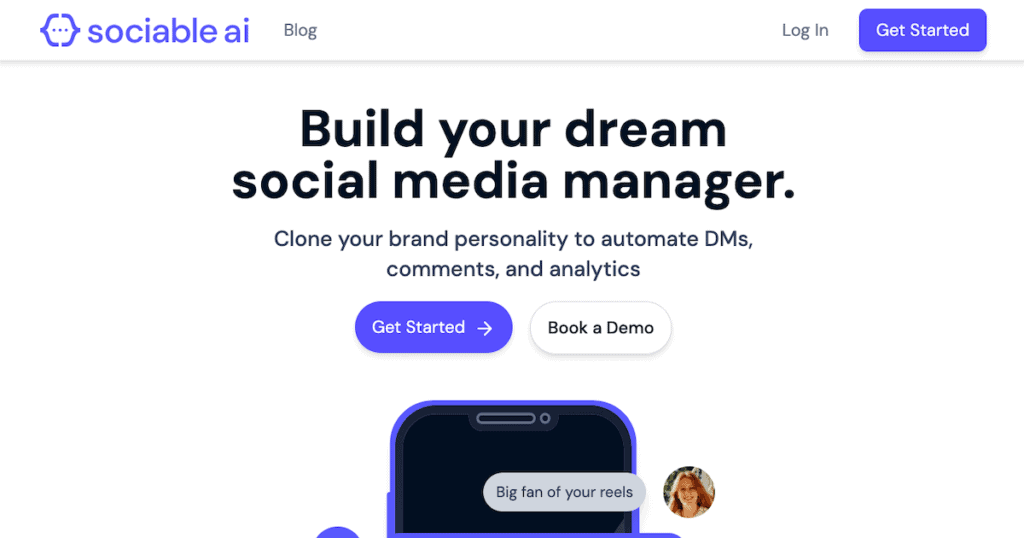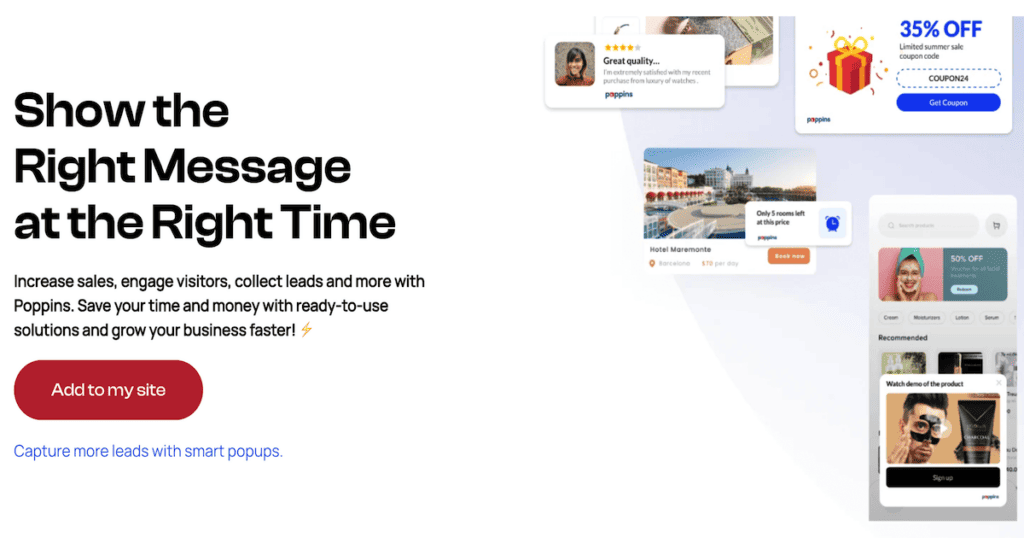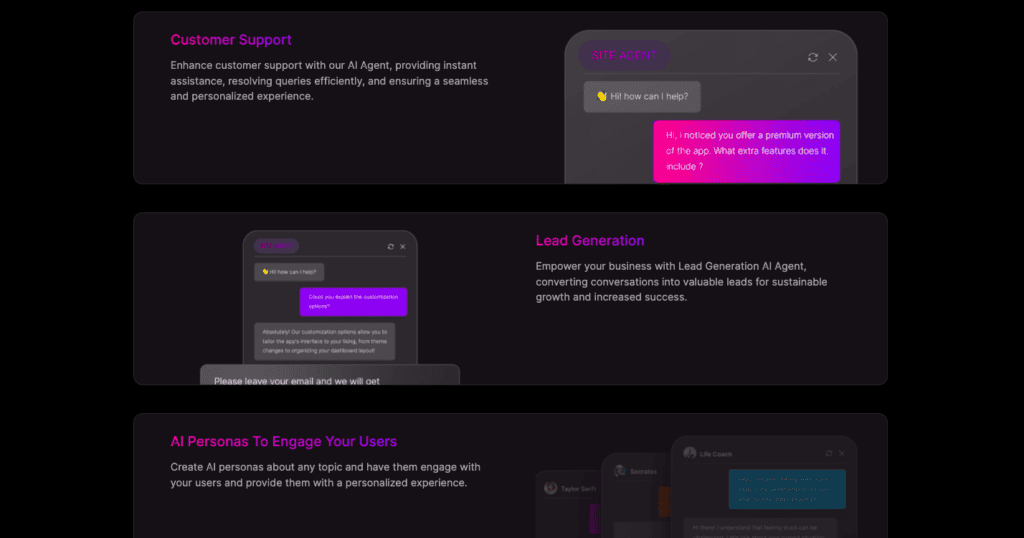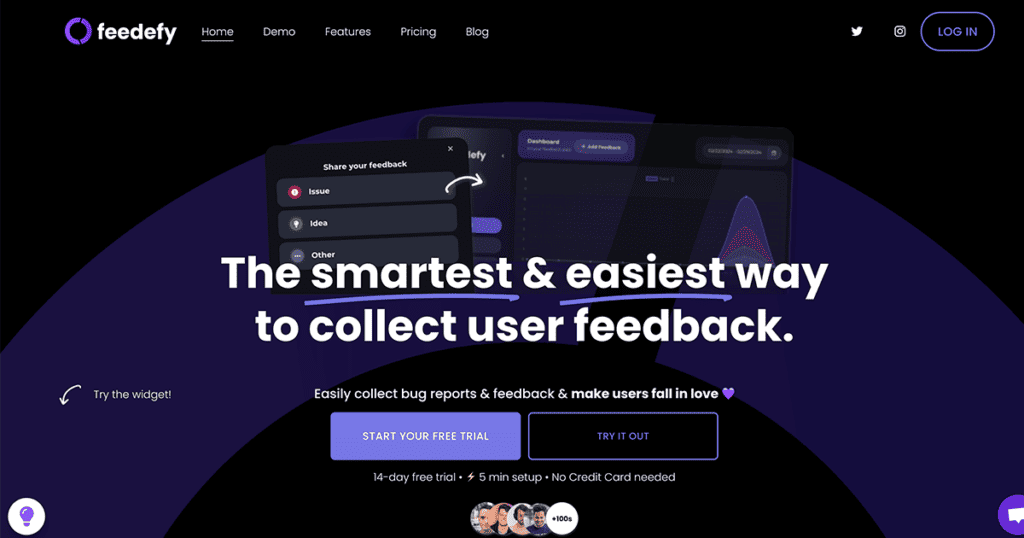
Customer Engagement

Customer engagement software has become essential for businesses aiming to engage customers effectively and maintain competitive edges. These advanced tools are designed to streamline communication, track and analyze customer interactions, and deliver personalized messages, all of which are crucial for building strong relationships with customers and prospects. By leveraging customer engagement tools, companies can ensure that every interaction is meaningful and tailored to meet customer expectations, leading to increased customer loyalty and, subsequently, increased revenue.
At the core of these platforms lies the ability to analyze customer interactions and derive data-driven insights. This capability enables businesses to fine-tune their marketing efforts and customer engagement strategies, ensuring that they communicate with customers in the most effective manner possible. Whether through email, social media, or a mobile app, the goal is to make engaging customers a seamless and integrated part of the business process.
Management software and marketing software have evolved to incorporate customer engagement solutions, going beyond mere transactional relationships to foster genuine relationship growth. This evolution reflects a broader shift in how companies view their interactions with customers—not just as opportunities for immediate sales, but as chances to build long-term loyalty and engagement.
With automated workflows and the ability to send personalized messages, companies can now more easily keep in touch with their customers, making every interaction count. This personalized approach not only meets but often exceeds, customer expectations, solidifying the foundation for enduring relationships and sustained business growth.
Understanding Customer Engagement in the Digital Age
Customer engagement tools have transformed how businesses interact with their audience in the digital age. Today, it’s possible to manage all your customer interactions from a single platform, offering unparalleled convenience and efficiency. This integration allows companies to provide a consistent and personalized experience across various channels, which is key to building trust and loyalty.
These tools enable businesses to gather insights from every customer interaction, which can then be used to tailor future communications and strategies. By understanding the needs and behaviors of their audience, companies can create more relevant and engaging content, fostering a deeper connection with their customers.
The Essence of Customer Engagement
At its heart, customer engagement is about creating meaningful connections with your audience. By utilizing customer engagement tools, businesses can ensure that every interaction adds value for the customer, whether it’s through providing helpful information, offering support, or engaging in a conversation. This approach not only improves the customer experience but also builds a strong foundation for loyalty and advocacy.
Effective customer engagement goes beyond occasional interactions, aiming instead to create an ongoing dialogue. Through regular, meaningful communication, businesses can keep their brand at the forefront of their customers’ minds, encouraging repeat business and referrals. The right tools make this process more manageable and more effective, enabling businesses to maintain a consistent presence in their customers’ lives.
The Evolution from CRM to Customer Engagement Platforms
The journey from traditional CRM systems to comprehensive customer engagement platforms marks a significant shift in how businesses approach their relationships with customers. Initially focused on managing customer data, CRM systems have evolved to include tools for gathering customer feedback, understanding engaged customers, and improving conversion rates. Modern customer engagement platforms build on this foundation, offering integrated feedback forms and analytics to craft personalized customer experiences. These platforms support dynamic customer engagement strategies, enabling businesses to connect with their audience more effectively and foster deeper relationships.
Beyond Sales: Fostering Long-Term Relationships
In today’s competitive landscape, the focus of customer engagement has shifted from merely closing sales to fostering long-term relationships. This shift recognizes that the true value lies not in single transactions but in cultivating ongoing loyalty and engagement. By prioritizing relationship growth, businesses can unlock greater lifetime value from their customers, turning them into advocates for the brand.
Engagement strategies now emphasize personalized interactions and experiences that resonate with individual customers, acknowledging their unique needs and preferences. This approach not only enhances customer satisfaction but also encourages repeat business and referrals, contributing to a sustainable growth cycle. In essence, by investing in the relationships with their customers, businesses are investing in their own long-term success.
The Mechanics of Customer Engagement Software
Customer engagement software equips businesses with the tools necessary to create a seamless and engaging customer experience. These platforms provide a centralized hub for managing all aspects of customer interaction, from initial contact through to post-purchase support. By consolidating these functions, businesses can ensure consistency in their communications and interactions, fostering a sense of reliability and trust among their customer base.
Moreover, this software enables companies to automate repetitive tasks, allowing staff to focus on more complex and meaningful forms of engagement. Whether it’s scheduling follow-up emails, managing social media posts, or tracking customer inquiries, automation helps streamline operations and ensures no customer is overlooked. This level of efficiency and attentiveness can significantly enhance the overall customer experience, leading to higher satisfaction rates and, ultimately, more successful business outcomes.
How These Platforms Transform the Customer Experience
Customer engagement platforms transform the customer experience by allowing businesses to interact with their customers through their preferred channels. This flexibility ensures that customers feel heard and valued, regardless of how they choose to communicate. By meeting customers where they are, companies can deliver more personalized and effective service, enhancing satisfaction and loyalty.
From Reactive to Proactive: The Shift in Customer Service
The transition from reactive to proactive customer service represents a pivotal shift in the customer engagement landscape. Instead of simply responding to issues as they arise, businesses are now leveraging customer engagement software to anticipate customer needs and address them proactively. This approach, powered by targeted messaging, allows companies to solve problems before they impact the customer, creating a smoother and more enjoyable experience.
Proactive engagement strategies include sending helpful tips, reminders, or personalized offers that add value for the customer. This not only improves the customer experience but also strengthens the relationship between businesses and their customers, fostering loyalty and encouraging repeat business. By adopting a proactive stance, companies can differentiate themselves in a crowded market and secure a competitive advantage.
The Pinnacle of Customer Interaction: Top 12 Software
The world of customer engagement software is diverse and dynamic, offering a range of solutions tailored to different business needs. Among these, direct messages have emerged as a powerful tool for personal, immediate communication. This feature is particularly effective for engaging with customers in real-time, providing support, and fostering a sense of connection and responsiveness that today’s consumers expect.
1. HubSpot CRM Suite
The HubSpot CRM Suite stands out as a comprehensive customer engagement solution, integrating content management, the Marketing Hub, the Service Hub, and the Operations Hub. This suite offers a holistic approach to managing customer relationships, streamlining processes, and enhancing communication across all stages of the customer journey.
A Comprehensive Tool for Sustained Customer Engagement
HubSpot CRM Suite excels in providing businesses with the tools needed for sustained customer engagement. By integrating various aspects of customer interaction, from marketing to service, it ensures that every touchpoint is an opportunity to strengthen the relationship. The suite’s ability to consolidate data across different channels allows for a unified view of the customer, enabling more personalized and effective engagement strategies.
Furthermore, the suite’s robust analytics capabilities empower businesses to track the effectiveness of their engagement efforts, providing insights that can be used to refine strategies over time. With its comprehensive approach to customer engagement, the HubSpot CRM Suite is an invaluable asset for businesses looking to elevate their customer interactions and drive long-term loyalty.
2. Zendesk
Zendesk stands as a formidable CRM platform, specializing in transforming potential customers into loyal advocates. Its strength lies in its ability to streamline customer conversations across multiple channels, ensuring that every interaction is both meaningful and effective.
Streamlining Customer Conversations Across Channels
By offering a unified platform for customer service and engagement, Zendesk makes it easier for businesses to provide personalized experiences to their customers. This alignment ensures that regardless of the communication channel—be it email, social media, or live chat—customers receive timely and relevant responses. The emphasis on streamlining customer conversations helps in building stronger, more personal connections with each interaction.
Zendesk’s focus on personalized experiences is crucial in today’s market, where customers expect not just responses but understanding and customization according to their needs. By equipping businesses with the tools to meet these expectations, Zendesk plays a critical role in enhancing customer satisfaction and loyalty, contributing to the overall success of the businesses it serves.
3. Intercom
Intercom stands out as a pioneering platform, revolutionizing customer engagement through its robust in-app messaging and marketing teams’ collaboration features. By enabling direct, meaningful conversations with customers within the app environment, Intercom offers businesses a unique opportunity to enhance engagement and foster stronger relationships. Its intuitive interface and sophisticated tools empower marketing teams to tailor communications that resonate with each user, making every interaction feel personal and relevant.
Personalizing Customer Communications at Scale
Intercom excels in personalizing customer communications, ensuring that businesses can reach out to their audience on their preferred channels. This approach not only maximizes engagement but also significantly improves the customer experience. By analyzing user behavior and preferences, Intercom allows for targeted messages that speak directly to the customer’s needs and interests, ensuring that every communication feels like it’s made just for them.
Moreover, this platform’s ability to handle communication at scale means businesses can maintain a personal touch with thousands of customers simultaneously. Whether it’s through email, in-app messages, or other preferred channels, Intercom’s sophisticated algorithms ensure that the right message reaches the right person at the right time, making large-scale marketing campaigns feel as personalized as one-on-one conversations.
4. Optimizely
Optimizely has become synonymous with experimentation and personalization in customer engagement, offering tools that allow businesses to test and refine their digital experiences in real-time. By leveraging Optimizely, companies can make data-driven decisions that significantly enhance the customer journey, tailoring each interaction to meet users’ evolving expectations. This platform’s strength lies in its ability to seamlessly integrate with other digital tools, making it easier for businesses to create a cohesive and personalized customer experience across all digital touchpoints.
Experimentation and Personalization to Boost Engagement
The heart of Optimizely’s platform is its experimentation engine, which empowers businesses to conduct A/B testing and multivariate testing with ease. This capability allows companies to explore different engagement strategies and content types, understanding what resonates best with their audience. By continuously refining and optimizing the customer experience based on real user data, businesses can significantly increase engagement rates and build deeper connections with their audience.
Furthermore, Optimizely’s personalization features take customer engagement to the next level. By analyzing user behavior and leveraging predictive analytics, businesses can create highly personalized experiences that anticipate customer needs and preferences. This proactive approach to engagement not only delights customers but also drives loyalty and long-term relationships, ensuring that businesses stay ahead in the competitive digital landscape.
5. Sprinklr
Sprinklr has redefined customer engagement by offering a unified customer view that consolidates interactions across multiple channels into a single platform. This capability is more critical than ever, as customers engage with brands through a growing array of digital touchpoints. Sprinklr’s comprehensive platform enables businesses to listen, engage, and connect with customers more effectively, ensuring that every interaction is informed by a deep understanding of the customer’s history and preferences.
Unified Customer View for Enhanced Interactions
The strength of Sprinklr lies in its ability to aggregate and analyze data from various customer interactions, providing businesses with a 360-degree view of the customer journey. This unified customer view enables companies to deliver cohesive and consistent experiences, regardless of the communication channel. By having a comprehensive understanding of each customer’s interactions, preferences, and feedback, businesses can tailor their engagement strategies to meet individual needs, significantly enhancing the overall customer experience.
Furthermore, Sprinklr’s advanced analytics tools help businesses to identify trends, monitor sentiment, and gauge the effectiveness of their engagement strategies. This insight is invaluable for companies looking to continuously improve their customer interactions and foster stronger, more meaningful relationships. By leveraging Sprinklr’s unified customer view, businesses can ensure that every engagement is strategic, personalized, and impactful, setting the stage for enhanced customer loyalty and long-term success.
6. Twilio
Twilio has revolutionized communication for businesses, providing a powerful platform that enables custom communication workflows tailored to each company’s unique needs. With its focus on customer profiles and customer-facing teams, Twilio facilitates more personalized and efficient interactions. By leveraging Twilio, businesses can bridge the gap between their services and their customers, ensuring that every communication is timely, relevant, and engaging, thereby enhancing the overall customer experience.
Building Custom Communication Workflows with Ease
Twilio’s platform excels in allowing businesses to build custom communication workflows with remarkable ease. By integrating various communication channels such as SMS, voice, email, and even WhatsApp into a single workflow, Twilio ensures that businesses can reach their customers on their preferred platforms without any hassle. This flexibility is crucial for creating seamless customer experiences that meet the high expectations of today’s digital consumers.
Furthermore, Twilio’s advanced features enable customer-facing teams to engage with customers more effectively by providing comprehensive customer profiles that include interaction history, preferences, and more. This level of detail allows teams to personalize their communications and resolve issues more efficiently, leading to higher satisfaction rates. The ability to customize and automate communication workflows based on specific customer data makes Twilio an indispensable tool for businesses aiming to enhance their customer engagement strategies.
7. Mixpanel
Mixpanel stands out in the customer engagement software space due to its powerful analytics, which provide deep insights into how customers interact with applications. This platform enables marketing teams to understand user behavior at a granular level, allowing for the optimization of in-app messaging to boost engagement and retention. By leveraging Mixpanel, businesses can make data-driven decisions that significantly enhance the user experience, tailor communications to individual preferences, and ultimately drive growth.
Data-Driven Insights to Fuel Engagement Strategies
The power of Mixpanel lies in its ability to provide marketing teams with data-driven insights that inform strategic decisions. By understanding how customers interact with their applications, businesses can identify areas for improvement and opportunities to enhance engagement. Mixpanel’s analytics allow for the tracking of user actions in real-time, offering a detailed view of the customer journey and enabling the creation of personalized in-app messaging that resonates with users.
Moreover, Mixpanel’s advanced segmentation and analysis tools enable businesses to refine their engagement strategies over time. By continually analyzing how different segments of users interact with their app, companies can tailor their messaging and features to meet the specific needs of each group. This targeted approach to engagement helps in fostering a more personal connection with users, encouraging loyalty and driving long-term success.
8. Userpilot
Userpilot enhances the user experience by providing targeted in-app messages and analytics tools that help businesses understand user behavior and preferences. This platform is designed to elevate the user journey through personalized guidance and support, making it easier for users to navigate applications and discover value quickly. By utilizing Userpilot, companies can drive adoption, increase user retention, and ultimately build stronger relationships with their customers.
Elevating User Experience with Targeted In-App Guidance
The core of Userpilot’s offering is its ability to deliver targeted messaging within applications. This targeted messaging ensures that users receive relevant guidance and support precisely when they need it, significantly improving the user experience. Userpilot’s analytics tools further enhance this personalization by allowing businesses to segment their users based on behavior, ensuring that each message is tailored to the user’s specific needs and stage in the customer journey.
Additionally, Userpilot enables businesses to implement in-app surveys and feedback tools, gathering valuable insights directly from users. This feedback is crucial for continuous improvement, allowing companies to refine their in-app guidance and overall user experience based on real user data. By leveraging targeted messaging and analytics, Userpilot helps businesses create a more intuitive and engaging application environment, leading to higher satisfaction and loyalty among users.
9. Typeform
Typeform revolutionizes the way businesses collect information from their customers by offering engaging forms and customer surveys that enhance the feedback process. Capturing customer insights through feedback forms is more seamless and interactive than ever, thanks to Typeform’s intuitive design and user-friendly interface. This platform enables businesses to create personalized and conversational forms that encourage higher response rates, providing valuable insights that drive customer-centric decisions.
Engaging Forms for Better Customer Feedback
With Typeform, creating forms that customers actually enjoy filling out is straightforward. The platform’s focus on design and user experience transforms the often tedious task of completing surveys into a pleasant interaction. This approach not only increases the likelihood of customers providing feedback but also enriches the quality of data collected, offering deeper insights into customer preferences and experiences.
Moreover, Typeform’s versatility allows businesses to customize feedback forms for various purposes, from market research to customer satisfaction surveys. By leveraging Typeform’s engaging forms, companies can gather actionable insights that inform product development, marketing strategies, and overall business decisions. This user-centric approach to collecting feedback ensures that businesses stay closely aligned with their customers’ needs and expectations, fostering stronger relationships and driving long-term success.
10. Kangaroo
Kangaroo leverages the power of sms marketing, rewards programs, and communication tools to foster deeper connections between businesses and their customers. By integrating these elements, Kangaroo enables companies to engage with their audience in a more personalized and impactful way, turning every interaction into an opportunity for loyalty and retention.
Rewards-Based Engagements for Increased Loyalty
Kangaroo’s platform shines in its ability to create a seamless rewards programs that engage customers beyond the point of sale. By offering meaningful rewards for various customer activities, it encourages ongoing engagement and fosters a sense of loyalty. The system’s flexibility allows businesses to tailor the rewards to fit their unique audience, ensuring that the incentives are relevant and enticing.
Moreover, the integration of sms marketing and sophisticated communication tools into the rewards experience enhances the overall effectiveness of customer engagement strategies. This approach not only simplifies the process of reaching out to customers but also enables a more personalized interaction with them, leading to higher satisfaction and loyalty rates.
11. Pendo
Pendo stands out for its focus on user experience, utilizing product analytics to guide businesses in creating more engaging and intuitive digital environments. By analyzing how users interact with applications and websites, Pendo provides actionable insights that help companies improve their offerings and meet customer needs more effectively.
Navigating User Experience with Product Analytics
With Pendo, businesses can dive deep into the user journey, identifying both friction points and areas of success within their applications or websites. This level of insight allows for targeted improvements that significantly enhance the user experience. Pendo’s analytics are designed to be easily understood, making it possible for teams to quickly implement changes that drive engagement and retention.
Furthermore, Pendo’s ability to segment user data means that companies can personalize the user experience at scale. Tailoring interactions based on user behavior leads to more meaningful connections and encourages users to engage with the product more deeply. This personalized approach is key to building a loyal user base in today’s competitive digital landscape.
12. Help Scout
Help Scout specializes in creating and managing customer conversations through a suite of conversational tools designed to enhance customer support. By streamlining communication, Help Scout makes it easier for businesses to provide timely, personal responses to customer inquiries, leading to improved satisfaction and loyalty.
Enhancing Customer Support with Conversational Tools
The conversational tools offered by Help Scout allow support teams to manage multiple customer interactions efficiently, ensuring that each customer feels heard and valued. This personalized approach to customer service not only resolves issues more effectively but also builds a stronger relationship between the customer and the brand.
In addition, Help Scout’s tools are designed with the customer journey in mind, offering features that anticipate customer needs and facilitate smoother interactions. This proactive approach to customer service sets businesses apart in a crowded market, making Help Scout an invaluable asset for companies looking to elevate their customer support experience.
Choosing the Right Customer Engagement Platform
When selecting a customer engagement platform, it’s crucial to consider how it will fit with your existing systems, its scalability, and whether it offers advanced analytics and reporting. You’ll want a platform that allows for highly personalized interactions with your customers, enabling you to engage with them across various channels and gather feedback to make data-driven decisions. The right platform will help you create meaningful interactions, tailor personalized campaigns based on customer preferences, and ultimately improve your customer satisfaction and loyalty.
Integration with Existing Systems
Integrating a new customer engagement platform with your current systems should be seamless, minimizing disruptions to your operations. Look for a platform that easily connects with your existing tools, allowing you to maintain a cohesive workflow. This compatibility is crucial for ensuring that customer data flows smoothly between systems, providing a unified view of customer interactions.
Additionally, the right platform will enhance your ability to manage customer relationships by consolidating data from various sources. This integration empowers your team to deliver a more coordinated and efficient customer experience, making it easier to meet and exceed customer expectations.
Scalability and Flexibility
A scalable customer engagement platform can grow with your business, accommodating increased volume without sacrificing performance or user experience. Flexibility in customizing features and workflows is also essential, as it allows you to adapt the platform to fit your evolving business needs and customer expectations.
Investing in a platform that offers scalability ensures that you can continue to deliver high-quality customer engagements as your business expands. It’s a critical consideration for businesses planning for long-term growth and looking to build lasting relationships with their customers.
Advanced Analytics and Reporting
Advanced analytics and reporting capabilities are essential for understanding customer behaviors and refining engagement strategies. A platform equipped with powerful analytics tools can provide deep insights into how customers interact with your brand, enabling you to make informed decisions and optimize your engagement efforts.
These analytics should offer a comprehensive view of customer activities and preferences, allowing you to track engagement metrics and measure the effectiveness of your strategies. By leveraging these insights, you can enhance customer experiences and drive better business outcomes.
Customization and Personalization Capabilities
Today’s customers expect personalized experiences that reflect their preferences and history with your brand. A customer engagement platform with strong customization and personalization capabilities allows you to deliver these experiences across all digital channels, creating more meaningful interactions.
Whether through targeted messaging, personalized content, or tailored rewards, the ability to customize engagements based on customer data is crucial. Such capabilities ensure that your communications resonate with customers, fostering greater loyalty and engagement.
The Role of Automation in Enhancing Engagement
Automation plays a key role in enhancing customer engagement by streamlining operations and allowing your team to focus on tasks that require a human touch. By automating repetitive tasks, you can ensure that customers receive timely and consistent interactions, improving overall business outcomes.
Streamlining Repetitive Tasks for Improved Efficiency
Automation tools enable customers to find answers to common questions quickly, without the need for direct interaction with your team. This not only improves efficiency but also enhances the customer experience by providing immediate resolutions to their inquiries.
Furthermore, automation can help manage large volumes of customer interactions, ensuring that each customer receives a personalized response. This level of efficiency and personalization is essential for maintaining high engagement rates and building strong customer relationships.
Anticipating the Future: The Next Wave of Customer Engagement
The future of customer engagement is likely to be shaped by further advancements in technology, including AI and machine learning, which will enable even more personalized and proactive interactions. As these technologies evolve, businesses will have new opportunities to engage with their customers in innovative ways, leveraging real-time analytics and predictive modeling to anticipate customer needs and preferences.
Moreover, the integration of these technologies with existing customer engagement platforms will allow businesses to deliver experiences that are not only highly personalized but also seamless across various channels. This evolution will drive the next wave of customer engagement, where the focus shifts from transactions to building deeper, more meaningful relationships with customers.
From Engagement to Experience: The Expanding Scope
The journey from customer engagement to customer experience represents a holistic shift. It’s not just about how you talk to your customers through various communication channels but also about how those interactions make them feel across every digital channel. This transition underscores the importance of creating memorable experiences that resonate well beyond the initial sale, turning engagement into a comprehensive experience that fosters loyalty and advocacy among your customer base.
By focusing on the entire customer lifecycle, businesses are now leveraging technology to understand and anticipate customer needs better. This means integrating feedback and insights across all touchpoints to design more intuitive and personalized interactions. As a result, the scope of customer engagement has broadened, encompassing every aspect of the customer journey, from awareness and consideration to purchase and post-purchase support, thus elevating the overall customer experience.
The Role of AI and Machine Learning
Artificial Intelligence (AI) and Machine Learning are at the forefront of transforming customer engagement. These technologies are being used to analyze vast amounts of data from various digital channels, enabling businesses to understand customer behaviors and preferences with unprecedented precision. This deep insight allows for the delivery of highly personalized content, recommendations, and solutions, enhancing the customer experience and driving loyalty.
Predictive Analytics for Proactive Engagement
Predictive analytics, powered by AI, is revolutionizing the way businesses engage with their customers by enabling a shift from reactive to proactive engagement. By analyzing customer data and predicting future behaviors, companies can now anticipate customer needs and address them before they even arise. This proactive approach not only enhances customer satisfaction but also fosters a sense of being understood and valued by the brand.
This technology allows for the identification of patterns and trends that inform strategic decisions around product development, marketing, and customer service initiatives. By leveraging predictive analytics, businesses can create more relevant and timely interactions, ensuring that customers receive the right message at the right time, thus significantly improving the overall customer engagement strategy.
Harnessing the Power of Customer Engagement Software for Your Business
To stay competitive, leveraging customer engagement software is no longer optional; it’s a necessity. These platforms offer a suite of tools designed to enhance communication channels and digital channels, ensuring that every customer interaction is meaningful and impactful. By integrating such software into your business operations, you can streamline processes, improve efficiency, and deliver a superior customer experience that drives loyalty and growth.
Strategic Implementation for Maximum Impact
The successful implementation of customer engagement software requires a strategic approach. It’s crucial to align the software’s capabilities with your business goals and customer needs. This means carefully selecting features that enhance your engagement efforts and training your team to leverage these tools effectively. A strategic implementation ensures that the software complements your existing processes and enriches customer interactions at every touchpoint.
Training and Support for Smooth Adoption
Adopting new technology can be challenging, which is why training and support are critical components of a successful implementation. Providing your team with comprehensive training on how to use customer engagement software ensures they are equipped to maximize its benefits. Additionally, ongoing support from the software provider can help resolve any issues promptly, minimizing disruptions to your operations and customer service.
Moreover, involving your team in the selection process can foster a sense of ownership and ease the transition to new systems. By empowering your employees with the right tools and knowledge, you can enhance their efficiency and effectiveness in engaging with customers, leading to improved customer satisfaction and loyalty.
Measuring Success: Metrics That Matter
To truly understand the impact of your customer engagement efforts, focusing on key metrics is essential. Metrics such as increased customer satisfaction scores (CSAT) and Net Promoter Score (NPS) offer valuable insights into how customers perceive their interactions with your brand. Additionally, monitoring engagement rates can help you gauge the effectiveness of your strategies and identify areas for improvement. By analyzing these metrics, you can make data-driven decisions that further enhance customer engagement and drive business success.
Customer Satisfaction Scores (CSAT)
Customer Satisfaction Scores (CSAT) are a direct reflection of how your customers feel about their experiences with your brand. High CSAT scores indicate that your customer engagement strategies are effective, leading to positive experiences and higher customer retention rates. These scores are gathered through customer surveys and feedback mechanisms, providing you with actionable insights into your customers’ satisfaction levels.
Improving your CSAT scores requires a deep understanding of customer needs and expectations. By analyzing feedback and implementing changes based on customer suggestions, you can enhance your products, services, and interactions. This not only boosts CSAT scores but also contributes to long-term customer loyalty and advocacy, key drivers of business growth.
Net Promoter Score (NPS)
The Net Promoter Score (NPS) is a powerful metric that measures customer loyalty and the likelihood of them recommending your brand to others. A high NPS indicates that your customers are not only satisfied but also enthusiastic advocates of your brand. This level of advocacy is crucial for organic growth and can be directly influenced by effective customer engagement strategies.
To improve your NPS, it’s essential to exceed customer expectations through personalized interactions, exceptional service, and by delivering value beyond the sale. Encouraging customers to provide feedback and acting on their suggestions can also enhance your NPS, as it demonstrates that you value their input and are committed to continuous improvement.
Engagement Rate
Engagement rate is a critical metric that measures the effectiveness of your interactions with customers across various platforms. A high engagement rate indicates that your content is resonating with your audience, driving meaningful interactions and fostering a strong connection with your brand. To boost your engagement rate, focus on delivering relevant and compelling content that encourages customer participation and feedback.
Moreover, optimizing your communication channels to ensure a seamless and enjoyable customer experience can significantly impact your engagement rate. This includes personalizing communications, using customer data to tailor interactions, and being responsive to customer inquiries and feedback. By enhancing your engagement strategies, you can increase customer loyalty and drive business success in the digital age.
Elevating Your Customer Engagement Strategy: Final Thoughts
In today’s digital world, your ability to connect with your customers on a deeper level can set you apart from your competitors. By leveraging the power of customer engagement software, you have the tools at your fingertips to create meaningful experiences that resonate with your audience. The integration of automation capabilities ensures that repetitive tasks are streamlined, allowing you and your team to focus on crafting more personalized and impactful customer interactions.
Moreover, the use of advanced analytics provides you with a treasure trove of data, offering insights into customer behaviors and preferences. This knowledge empowers you to make informed decisions that can significantly enhance your customer engagement strategies. By understanding what your customers want and need, you can tailor your offerings to meet their expectations, thereby fostering loyalty and driving business growth.
Ultimately, the journey toward elevating your customer engagement strategy is ongoing. It requires a commitment to continuous improvement and adaptation to new technologies and market trends. By choosing the right customer engagement platform and focusing on key areas such as automation capabilities, advanced analytics, and personalized experiences, you can ensure that your business remains at the forefront of customer satisfaction. Remember, in the realm of customer engagement, the goal is not just to meet expectations but to exceed them, creating lasting relationships that benefit both your customers and your business.
Our collection of Customer Engagement Deals

Octokit
Read more about Octokit
FullContext
Read more about FullContext
Storeez.app
Read more about Storeez.app
Boomerangme
Read more about Boomerangme
DealLab
Read more about DealLab
Sociable AI
Read more about Sociable AI
Poppins
Read more about Poppins
SiteAgent
Read more about SiteAgent
Milestone
Read more about Milestone
Feedefy
Read more about Feedefy

Sierra
Read more about Sierra
ActiveCalculator
Read more about ActiveCalculator
Noodle
Read more about Noodle
Social Proofy
Read more about Social Proofy










